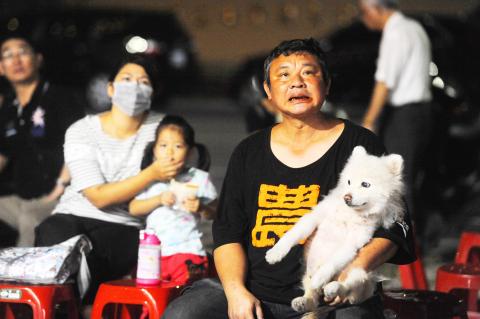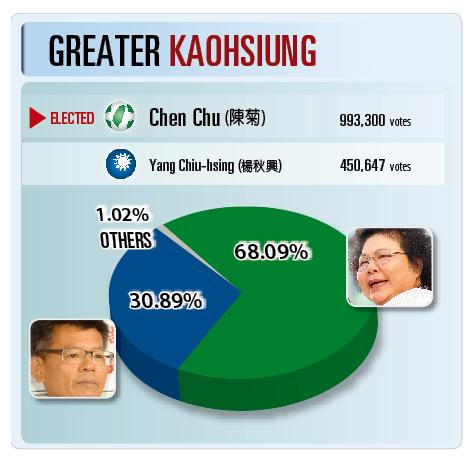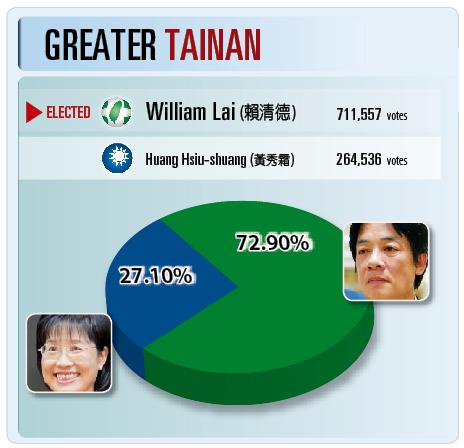Greater Kaohsiung and Greater Tainan yesterday saw their political “status quo” maintained after incumbent Kaohsiung Mayor Chen Chu (陳菊) and Tainan Mayor William Lai (賴清德), both members of the Democratic Progressive Party (DPP), succeeding in being elected for a second term in office.
Chen received 993,300 votes, or 68.09 percent of the votes cast, while Chinese Nationalist Party (KMT) mayoral candidate Yang Chiu-hsing (楊秋興) received 450,647 votes, for 30.89 percent of the total.
Independent mayoral candidate Chou Ke-sheng (周可盛) received 14,925 votes, or 1.02 percent of the total.

Photo: Chang Chung-yi, Taipei Times
Chen’s votes had increased from 821,089 votes, or 52.79 percent of the total in 2010.
Chen said she would continue her policies of helping Greater Kaohsiung’s transition to a more habitable city, maintaining district equality, increasing social welfare and helping industry become more innovative.
Chen also expressed gratitude to supporters for voting for her and being steadfast supporters of the DPP, and extended thanks to all of her campaign personnel as well, as she had been busy overseeing the rebuilding the city after the gas pipeline explosions in early August.

Graphic: TT
Meanwhile, Yang acknowledged that he lost the election and said it was “a severe setback,” but said that he wished to thank the people of Greater Kaohsiung who had supported him.
In Greater Tainan, although the mayoral candidates’ nominations of both parties had all but settled the question of who would win the election, the focus on the mayoral elections was instead on the number of votes that Lai would receive.
Though Lai’s popularity in the city was expected, pundits said that the more votes Lai received, the more it would help his future career.

Graphic: TT
Greater Tainan election results concluded with Lai receiving 711,557 votes, or 72.9 percent of the votes, while the KMT’s Huang Hsiu-shuang (黃秀霜) received 264,536 votes, or 27.1 percent of the total.
Compared with the results from the previous election in 2010, Lai’s votes have increased by 91,660 from 2010’s 619,897, and his support rate has increased by 12.49 percentage points from 60.41 percent.

Alain Robert, known as the "French Spider-Man," praised Alex Honnold as exceptionally well-prepared after the US climber completed a free solo ascent of Taipei 101 yesterday. Robert said Honnold's ascent of the 508m-tall skyscraper in just more than one-and-a-half hours without using safety ropes or equipment was a remarkable achievement. "This is my life," he said in an interview conducted in French, adding that he liked the feeling of being "on the edge of danger." The 63-year-old Frenchman climbed Taipei 101 using ropes in December 2004, taking about four hours to reach the top. On a one-to-10 scale of difficulty, Robert said Taipei 101

A preclearance service to facilitate entry for people traveling to select airports in Japan would be available from Thursday next week to Feb. 25 at Taiwan Taoyuan International Airport, Taoyuan International Airport Corp (TIAC) said on Tuesday. The service was first made available to Taiwanese travelers throughout the winter vacation of 2024 and during the Lunar New Year holiday. In addition to flights to the Japanese cities of Hakodate, Asahikawa, Akita, Sendai, Niigata, Okayama, Takamatsu, Kumamoto and Kagoshima, the service would be available to travelers to Kobe and Oita. The service can be accessed by passengers of 15 flight routes operated by

Taiwanese and US defense groups are collaborating to introduce deployable, semi-autonomous manufacturing systems for drones and components in a boost to the nation’s supply chain resilience. Taiwan’s G-Tech Optroelectronics Corp subsidiary GTOC and the US’ Aerkomm Inc on Friday announced an agreement with fellow US-based Firestorm Lab to adopt the latter’s xCell, a technology featuring 3D printers fitted in 6.1m container units. The systems enable aerial platforms and parts to be produced in high volumes from dispersed nodes capable of rapid redeployment, to minimize the risk of enemy strikes and to meet field requirements, they said. Firestorm chief technology officer Ian Muceus said

MORE FALL: An investigation into one of Xi’s key cronies, part of a broader ‘anti-corruption’ drive, indicates that he might have a deep distrust in the military, an expert said China’s latest military purge underscores systemic risks in its shift from collective leadership to sole rule under Chinese President Xi Jinping (習近平), and could disrupt its chain of command and military capabilities, a national security official said yesterday. If decisionmaking within the Chinese Communist Party has become “irrational” under one-man rule, the Taiwan Strait and the regional situation must be approached with extreme caution, given unforeseen risks, they added. The anonymous official made the remarks as China’s Central Military Commission Vice Chairman Zhang Youxia (張又俠) and Joint Staff Department Chief of Staff Liu Zhenli (劉振立) were reportedly being investigated for suspected “serious